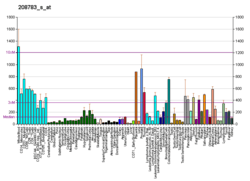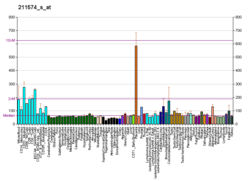CD46
CD46 complement regulatory protein also known as CD46 (cluster of differentiation 46) and Membrane Cofactor Protein is a protein which in humans is encoded by the CD46 gene.[3] CD46 is an inhibitory complement receptor.[4]
Gene
This gene is found in a cluster on chromosome 1q32 with other genes encoding structural components of the complement system. At least fourteen different transcript variants encoding fourteen different isoforms have been found for this gene.[5]
Function
The protein encoded by this gene is a type I membrane protein and is a regulatory part of the complement system.
The encoded protein has cofactor activity for inactivation (through cleavage) of complement components C3b and C4b by serum factor I, which protects the host cell from damage by complement.[6]
The protein encoded by this gene may be involved in the fusion of the spermatozoa with the oocyte during fertilization.[7]
Clinical significance
The encoded protein can act as a receptor for the Edmonston strain of measles virus,[8] human herpesvirus-6 (HHV-6), and type IV pili of pathogenic Neisseria.[9]
The extracellular region of CD46 contains four short consensus repeats (SCR) of about 60 amino acids that fold into a compact beta-barrel domain surrounded by flexible loops.[10] As has been demonstrated for CD46 with other ligands, the CD46 protein structure is believed to linearize upon binding HHV-6. While their precise interaction has not yet been determined, the second and third SCR domains have been demonstrated to be required for HHV-6 receptor binding and cellular entry. The heterotetramer gH/gL/gQ1/gQ2 complex of HHV-6 has been identified as a CD46 ligand.[11]
Established medulloblastoma (a malignant brain tumor common in childhood) specimens express CD46, and that medulloblastoma specimens removed from patients had a high level of CD46 expression. Therefore, a vaccine made of the Edmonston strain of measles virus could treat the medulloblastoma. Such a vaccine has already been tested in a number of trials involving other tumor types which have a high expression of CD46, including one type of adult brain tumor.[12]
Interactions
CD46 has been shown to interact with CD9,[13] CD151[13] and CD29.[13]
References
- ↑ "Human PubMed Reference:".
- ↑ "Mouse PubMed Reference:".
- ↑ Taylor CT, Biljan MM, Kingsland CR, Johnson PM (May 1994). "Inhibition of human spermatozoon-oocyte interaction in vitro by monoclonal antibodies to CD46 (membrane cofactor protein)". Hum. Reprod. 9 (5): 907–11. PMID 7929741.
- ↑ Liszewski MK, Post TW, Atkinson JP (1991). "Membrane cofactor protein (MCP or CD46): newest member of the regulators of complement activation gene cluster". Annu. Rev. Immunol. 9 (1): 431–55. PMID 1910685. doi:10.1146/annurev.iy.09.040191.002243.
- ↑ "Entrez Gene: CD46 CD46 molecule, complement regulatory protein".
- ↑ Riley-Vargas RC, Gill DB, Kemper C, Liszewski MK, Atkinson JP (September 2004). "CD46: expanding beyond complement regulation". Trends Immunol. 25 (9): 496–503. PMID 15324743. doi:10.1016/j.it.2004.07.004.
- ↑ Liszewski MK, Kemper C, Price JD, Atkinson JP (November 2005). "Emerging roles and new functions of CD46". Springer Semin. Immunopathol. 27 (3): 345–58. PMID 16200405. doi:10.1007/s00281-005-0002-3.
- ↑ Dörig RE, Marcil A, Richardson CD (September 1994). "CD46, a primate-specific receptor for measles virus". Trends Microbiol. 2 (9): 312–8. PMID 7529121. doi:10.1016/0966-842X(94)90447-2.
- ↑ Cattaneo R (May 2004). "Four viruses, two bacteria, and one receptor: membrane cofactor protein (CD46) as pathogens' magnet". J. Virol. 78 (9): 4385–8. PMC 387720
 . PMID 15078919. doi:10.1128/JVI.78.9.4385-4388.2004.
. PMID 15078919. doi:10.1128/JVI.78.9.4385-4388.2004. - ↑ Arbuckle, Jesse. "The molecular biology of human herpesvirus-6 latency and telomere integration". Microbes and infection. 13 (8–9): 731–741. PMC 3130849
 . PMID 21458587. doi:10.1016/j.micinf.2011.03.006.
. PMID 21458587. doi:10.1016/j.micinf.2011.03.006. - ↑ Mori (2009). "Recent topics related to human herpesvirus 6 cell tropism". Cell microbiology.
- ↑ Studebaker AW, Kreofsky CR, Pierson CR, Russell SJ, Galanis E, Raffel C (May 2010). "Treatment of medulloblastoma with a modified measles virus". Neuro Oncol. 12 (10): 1034–1042. PMC 3018921
 . PMID 20494960. doi:10.1093/neuonc/noq057.
. PMID 20494960. doi:10.1093/neuonc/noq057. - 1 2 3 Lozahic S, Christiansen D, Manié S, Gerlier D, Billard M, Boucheix C, Rubinstein E (March 2000). "CD46 (membrane cofactor protein) associates with multiple beta1 integrins and tetraspans". Eur. J. Immunol. 30 (3): 900–7. PMID 10741407. doi:10.1002/1521-4141(200003)30:3<900::AID-IMMU900>3.0.CO;2-X.
External links
- GeneReviews/NCBI/NIH/UW entry on Atypical Hemolytic-Uremic Syndrome
- OMIM entries on Atypical Hemolytic-Uremic Syndrome
- CD46 antigen at the US National Library of Medicine Medical Subject Headings (MeSH)
- Human CD46 genome location and CD46 gene details page in the UCSC Genome Browser.



